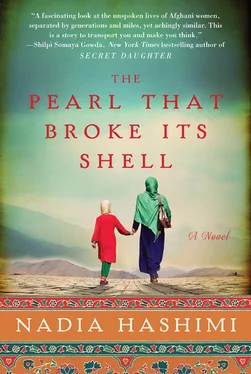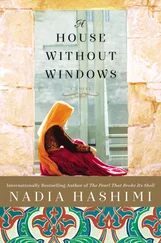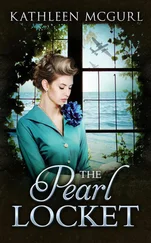Fakhria started to tell us about the shelter, about the girls who came there. She told us about a girl she called Murwarid. Murwarid was only fifteen years old, she said, and had come to the shelter two weeks ago, bruised and desperate. At the age of eight, she’d been married to a man in his sixties, living in the countryside. Her husband had abused her in every way possible. Her nose was crooked after he’d broken it twice. When he’d tired of her, he’d started to take her around to other villages, selling her off to men to have sex with her. She had tried to run away once before but he caught her and sliced off one ear, dragging her home by the other.
Six months later Murwarid decided again that she wouldn’t survive if she stayed with this man. And this time, if he killed her, she would be better off. So she ran.
She came to Kabul and found the women’s shelter, where she was living now, recovering. She still woke in the night screaming.
Fakhria invited us to visit the shelter. It would be great, she said, if the parliament could help support such a place. Maybe offer some training or jobs to the women living there.
Hamida and Sufia clucked their tongues to hear the stories Fakhria told.
I sat frozen. Too much of what she said sounded familiar.
You see that? Murwarid found her escape, I could hear Khala Shaima say. Why haven’t you found yours?
“Read this one to me.”
Badriya had unfolded Kabul’s weekly newspaper on the table. She pointed from one column to the next. She stopped me one paragraph into a story about drought conditions in a province to the south.
“Forget it. Who needs to know about that? I want to know what’s happening here. Try this one,” she said, picking out a column on the following page. I sighed and got ready to read about a new bank opening next month when I was interrupted.
A knock on our door.
“There’s a phone call from home. Come down to the lobby to take the call.” It was Hassan, our bodyguard.
“Now?” she huffed. “As if we haven’t had a long enough day!”
Badriya and I had just gotten plates of food sent up from the hotel kitchen. I loved the food there. Maybe it was that I had no part in cooking it or cleaning up after it. Maybe it was the pretty floral pattern of the plates. My mouth watered at the smell of the cumin-infused potato stew. I tore off a piece of bread as she resentfully left the room. I dipped a piece of bread into the stew and brought it to my mouth. The grease felt good on my lips. No reason for us both to eat cold meals, I figured.
Badriya returned a few moments later.
“The qorma is really good,” I announced as she walked in. I looked up and saw that her face was drained of color.
“Are you… are you all right?”
She looked at me, her mouth open slightly. Her eyes searched.
“Badriya- jan, what is it? Who was on the phone?”
Her hand covered her mouth. Something wasn’t right.
“Badriya- jan, are you all right?”
Suddenly, something in her shifted. She straightened her shoulders and pulled her lips together tightly.
“It was Abdul Khaliq on the phone. He called about Jahangir.”
My stomach fell at the sound of his name.
“He’s not well,” she said, choosing her words carefully. “He’s not well. Seems he’s been very sick since we left.”
“Since we left? Why didn’t he call sooner?”
“I don’t know, Rahima- jan . I don’t… he’s going to have Maroof take us back.”
“I want to go back now!”
“We are. Maroof is bringing the car around.”
I wanted to be there already. I wanted to see my son. The last time he had been ill, he’d spent two days in my arms. Whispering every prayer I could remember, I stroked the moist hairs from his sweaty forehead and watched his cherry lips tremble until the fever released him. I knew he must have cried for me and I hated that I wasn’t there.
We packed our belongings in a matter of minutes. Badriya moved surprisingly quickly. Forty minutes later, Abdul Khaliq’s SUV was on the main road leaving Kabul, whizzing past tanks and western soldiers, their curious eyes shielded by sunglasses. Maroof grunted something to Hassan in the passenger seat.
There was something peculiar about Badriya’s behavior. Jahangir, like all the other children in the compound, had survived fever and illness. I looked over at her. Badriya busied herself folding papers neatly and putting them away in her purse. Papers she couldn’t read.
“What did he say, Badriya? Do they want to take him to a doctor? Has he been eating anything?”
“I don’t know, dear girl. The connection was lousy and you know Abdul Khaliq. He doesn’t explain much.”
The hours dragged on. I tried to fall asleep, hoping I would open my eyes and find myself back at the compound, Jahangir coming to the gate to welcome me. It would be midnight before we got back. I hoped Jameela had made him a cup of the herbal tea she had given him last time. I hoped the other children were not disturbing him.
Just as I was beginning to drift off, it occurred to me that there was something odd about my conversation with Badriya. Something other than Jahangir being ill.
The way she had looked at me. What was that look?
Concern? Annoyance? Fatigue?
Pity.
I don’t know, dear girl.
Never before had she addressed me with endearments.
My mouth went dry. I started to pray.
Shekiba and Agha Baraan did not speak on the way to his home. Shekiba sat beside her new husband but kept her gaze straight ahead. Agha Baraan guided the horse expertly down Kabul’s busy streets, small shops and pedestrians everywhere. He looked in her direction only once but his expression told Shekiba nothing.
He turned down a narrow, house-lined street, homes packed so close together that a child could toss an apple into his neighbor’s courtyard. Shekiba thought of her village, the homes divided by kilometers of open fields.
Agha Baraan’s home was in the middle of the street; the royal-blue door set it apart from the rest.
Shekiba suddenly felt a panic set in at the thought of being behind those walls with this man. She briefly considered running — disappearing into Kabul’s maze of roads. But she remembered Azizullah dragging her back from Hakim- sahib ’s doorstep and decided against it.
He opened the door and she followed. The courtyard was small, much smaller than houses in her village, but it was neatly kept and had bright flowers and a birdcage with three small canaries. She followed her husband through the house door.
A woman in her twenties looked up from her needlework. She did not seem surprised.
“Gulnaz, this is Shekiba. You can show her to her room please. She has no belongings so you’ll have to give her a dress or two for now.”
Gulnaz stood up and looked at the blue cloak before her. Agha Baraan walked out, uninterested in how the two would take to each other.
“You can take your burqa off. You look ridiculous wearing it inside.” Shekiba understood by the tone of her voice that Gulnaz was Agha Baraan’s first wife and that she was not happy to see her. Shekiba lifted her burqa but kept her right profile toward Gulnaz.
“I hear they call you Shekiba -e-haleem . Let me see your face.”
Shekiba turned, making a point to look Gulnaz in the eye. Each woman took a moment to consider the other. Gulnaz was a beautiful woman but nowhere near as striking as Benafsha. She had almond-shaped eyes and gracefully arched brows. Her hair looked soft and thick, loose curls tossed over her shoulders.
Читать дальше












